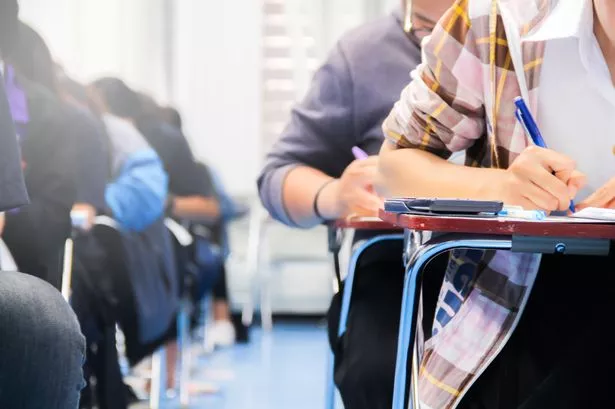Sometimes, teenagers don’t think much about their options at 16. They might just stay in the same school and take whatever qualifications are offered in sixth form. This works out well for many students and prepares them for the future, but it might not be the best choice for everyone.
It’s important to consider what subjects they want to study, what type of qualification they want, where they want to study, and if they prefer learning while working or not. Keep reading for advice on what might be best for your teen after they finish their GCSE years.
Furthermore, If your child already has an idea of what they want to do after leaving school at 18, it could affect their decisions. For instance, someone who wants to become a dentist will need to study sciences during sixth form.
What are the rules for 16-year-olds living in England and Wales?

All 16-year-olds have to keep learning until they’re 18. They don’t have to stay in school or go to college; they can get a job that includes training, but they can’t work full-time without some training. They can choose to study academic subjects like A levels, BTECs, IB, or T Levels, or they can do vocational training like an apprenticeship or a job with training.
If they’ve had trouble getting good grades in GCSE, they can do an internship or traineeship to gain experience and move forward.
Helping your teen decide what to study after their GCSEs
For some teens, choosing what to study after their GCSEs will be pretty simple. If they already know what they want to do when they finish school at 18, it might affect their choices. For example, someone who wants to become a dentist will need to study sciences in sixth form, or if they’re interested in IT, they might choose digital business services. Or, if they have a strong interest in a certain subject, like languages, they might want to study French, German, and Spanish.
But for others, figuring out what subjects to focus on might be harder, especially if they’re not sure what they want to do in the future (and might not even know if they want to continue their education after they turn 18). In these cases, it can be a good idea for your teen to pick subjects that give them a taste of different areas so they can explore what they like. Instead of sticking to similar subjects, they could try a mix. They should also think about what type of qualification they’d enjoy studying and then choose subjects based on what’s available for that type of qualification.
What type of qualification gives them the best chance of future success?

There are two main types of qualifications in sixth form: academic and vocational. Academic ones are focused on subjects and mostly theoretical, while vocational ones are more hands-on and relate to jobs and work.
A levels and BTECs are the most common ones, but there are other options that might suit your teen better.
Qualifications studied at school or college
- A levels
- BTECs
- Cambridge Technicals
- International Baccalaureates (IB) (offered by only a few schools)
- T Levels (in England, usually offered by colleges)
Qualifications studied through work (with time at an educational center for learning)
- Apprenticeships
- BTEC apprenticeships
- Technical qualifications (like NVQs, Tech Bac, or City and Guilds)
The better your teen does in sixth form, the more options they’ll have. They’re likely to do better when they’re studying something they enjoy in a way that suits them. Generally, those who like hands-on work and coursework might prefer BTECs, T Levels, or apprenticeships. Students who prefer listening and exams might like traditional A levels or the IB approach.
All these options can lead to further education after sixth form, so your teen won’t be closing any doors by choosing one. But some universities have specific entry requirements, like needing certain grades or subjects. If your teen has a particular university or course in mind, they should check what they need before deciding what to study.
If your teen has a career in mind but isn’t so good at the subjects needed for it, vocational courses can help. For example, if they want to work in business but struggle with maths, they could take a BTEC in Business Studies or a T Level in Business Services instead of a maths-heavy Economics A level. Or they might start an apprenticeship in an area they’re interested in, like hotels and leisure, and work towards their goal from a different angle.
Where to study after GCSEs?
Deciding where to study after GCSEs has its ups and downs. Staying at the same school might feel cozy because your teen knows the teachers and friends. Plus, being a role model to younger students can boost their confidence. But smaller schools might not offer as many subjects or courses, and your teen might feel too comfortable, like a big fish in a small pond.
Switching to another school for sixth form could be a good middle ground. If the new school offers the right subjects, it gives your teen a chance to meet new people and teachers while still getting support in a smaller setting. It might even open doors to more academic or hobby-focused schools.
Then there’s college, which offers a wide range of courses. It’s more like university life, with bigger classes and less hand-holding. This can be great for independent learners, but some teens might find it overwhelming.
If school or college isn’t the right fit, there are other options like independent learning providers or vocational training. But if your teen goes the vocational route, the location of their learning will depend on their employer’s arrangement.
Ultimately, the decision should consider your teen’s thoughts and feelings, but it’s their call in the end.
Your teen’s more likely to be successful at what they’re good at and enjoy

It’s important to consider what your teen enjoys and does well in. Usually, we do better at things we like. So if your teen loves certain subjects, they’ll probably do well in them in sixth form. Make sure they pick subjects they’re interested in, not just to please you, since they’ll be spending a lot of time on them.
While GCSE results can give an idea of their strengths, don’t worry if they haven’t studied a subject before. They can always ask their teacher for advice.
Also, think about whether your teen prefers hands-on or theoretical learning. This can affect their choice of subjects and qualifications.
Final Words
After finishing GCSEs, teenagers have different choices for what to do next. They can study academic subjects like A levels or more hands-on courses like apprenticeships. Some might stay in the same school, while others might switch or go to college. It’s important to pick what they enjoy and are good at, as this increases their chances of success. Whether they like reading and exams or prefer practical work, there’s an option for everyone. The main thing is to follow their interests and talents to have a happy and successful future!
